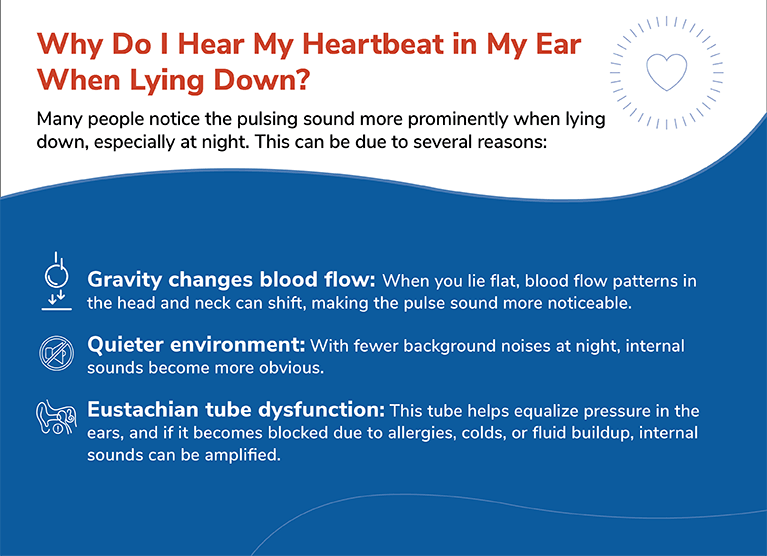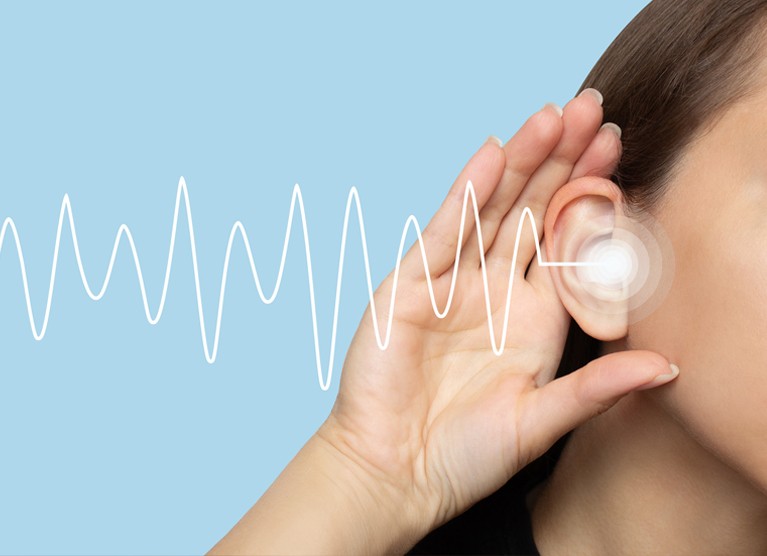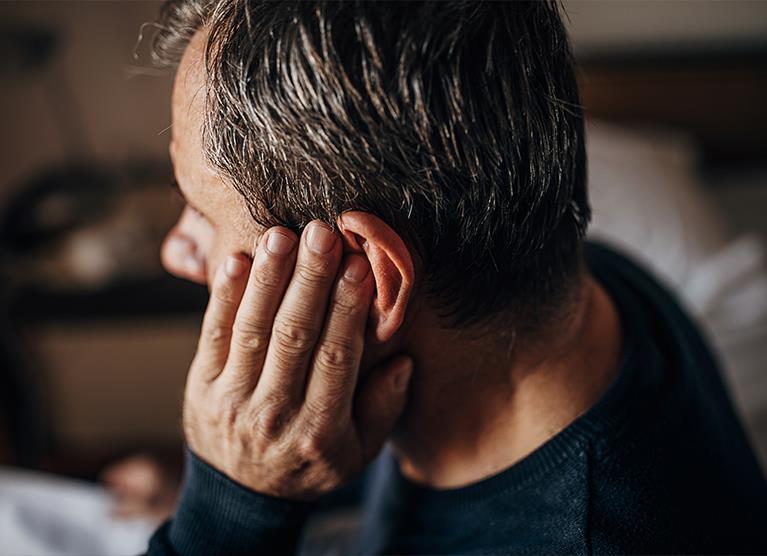Pulse in Ear: Possible Causes and Treatment Options
Can you hear the sound of your heartbeat in your ears? You're not alone. This surprisingly common symptom can be linked to a number of underlying conditions—some harmless, others more serious. Read on to understand why it happens and what steps you can take to find relief.
Have you ever said, “My heart was beating out of my chest”? Maybe you were recalling a suspenseful movie or describing a nerve-wracking presentation. While a racing heartbeat is a common response to stress or excitement, physically hearing your heartbeat in your ears might signal something else entirely.
What Is Pulsatile Tinnitus?
Hearing a pulsing sound that matches the rhythm of your heartbeat is called pulsatile tinnitus. It’s a specific type of tinnitus—a condition affecting about 50 million people in the United States. Unlike typical tinnitus, which is often described as a persistent ringing, buzzing, or hissing, pulsatile tinnitus sounds like rhythmic whooshing, thumping, or fluttering.
This pulsing occurs because you're hearing the sound of blood moving through vessels near your ears. It's sometimes loud enough to interfere with sleep or concentration.
How Is Pulsatile Tinnitus Different From Regular Tinnitus?
While both forms of tinnitus involve hearing a sound that doesn’t come from an external source, the key difference is rhythm.
- Regular tinnitus: A constant or intermittent sound such as ringing, buzzing, or hissing. Often caused by hearing loss or damage to the inner ear.
- Pulsatile tinnitus: A sound that beats in sync with your pulse. Often related to vascular (blood flow) issues near the ear.
This distinction is important because pulsatile tinnitus is more likely to have an identifiable—and treatable—underlying medical cause.

Why Do I Hear My Heartbeat in My Ear When Lying Down?
Many people notice the pulsing sound more prominently when lying down, especially at night. This can be due to several reasons:
- Gravity changes blood flow: When you lie flat, blood flow patterns in the head and neck can shift, making the pulse sound more noticeable.
- Quieter environment: With fewer background noises at night, internal sounds become more obvious.
- Eustachian tube dysfunction: This tube helps equalize pressure in the ears, and if it becomes blocked due to allergies, colds, or fluid buildup, internal sounds can be amplified.
Common Causes of Pulsatile Tinnitus
Pulsatile tinnitus can be caused by a wide range of conditions, including:
- High blood pressure (hypertension): Increased pressure makes blood flow more turbulent, which can generate noise.
- Fluid buildup in the ear: Often due to colds, sinus infections, or Eustachian tube blockage.
- Abnormal blood vessels: Conditions like arteriovenous malformations (AVMs) or vascular tumors can create pulsing sounds.
- Hearing loss: Age-related or noise-induced hearing loss can make internal sounds more noticeable.
- Ototoxic medications: Some medications can damage the ear and contribute to tinnitus. Common examples include aspirin, ibuprofen, certain antibiotics, and antidepressants.
- Stress and anxiety: Heightened stress can elevate blood pressure and increase awareness of bodily functions.
- Sleep position: Sleeping on one side can increase pressure on one ear and intensify the pulsing sound.
In addition, glomus jugulare tumors are rare tumors that can cause pulsatile tinnitus, which is a sound that matches your heartbeat. Other signs and symptoms may include:
- Hearing loss and ringing in the ears (pulsatile tinnitus).
- Difficulty swallowing and facial weakness.
- Dizziness and balance issues.
- A lump in the neck and hoarseness of the voice.
These symptoms can be mistaken for other conditions, making early diagnosis crucial. If you experience any of these signs, it is important to seek medical attention promptly.
Is Pulsing in the Ear Dangerous?
In most cases, pulsatile tinnitus is not dangerous. However, it can be a symptom of an underlying issue that needs medical evaluation—particularly if:
- It starts suddenly
- It occurs in only one ear
- It changes when you move your head or neck
- It’s accompanied by dizziness, headaches, or hearing loss
If any of these apply, it’s important to seek medical attention to rule out serious causes.
How Is Pulsatile Tinnitus Diagnosed?
Diagnosis typically begins with a visit to your general practitioner, who may:
- Measure your blood pressure
- Review your medication history
- Examine your ears and neck
- Order imaging tests like an MRI or CT scan to check for vascular abnormalities
If no serious medical condition is identified, you may be referred to a hearing care professional for a full hearing evaluation.
How Is Pulsatile Tinnitus Treated?
Treatment depends on the underlying cause. Some common treatment options include:
- Managing blood pressure: Lifestyle changes or medication may help if hypertension is the cause.
- Draining fluid: If caused by fluid buildup or ear infections, treatment may involve nasal sprays, antihistamines, or minor procedures.
- Discontinuing ototoxic drugs: Your doctor may recommend alternative medications.
- Stress management: Mindfulness, counseling, and relaxation techniques can help lower stress-related symptoms.
- Sound therapy or hearing aids: If hearing loss is a factor, custom-fit hearing aids can amplify ambient sounds and reduce the perception of internal noises.
Can Hearing Loss Cause a Pulse in the Ear?
Yes—when hearing loss reduces your ability to pick up external sounds, internal noises like your heartbeat may seem louder. This is known as auditory deprivation. In these cases, the brain tries to compensate for the lack of external sound by amplifying internal signals.
A hearing care professional can help determine if hearing loss is a contributing factor. Treatment with hearing aids often improves hearing and reduces the perception of pulsing or ringing sounds.

When to See a Hearing Specialist
If pulsatile tinnitus is interfering with your daily life, a comprehensive hearing evaluation is recommended. A licensed audiologist can:
- Determine if hearing loss is present
- Identify if tinnitus is linked to hearing-related conditions
- Offer tailored treatment options, including hearing aids and sound therapy
Early intervention can help manage symptoms and improve quality of life.
Take the First Step Toward Relief
While pulsatile tinnitus can be alarming, it's often treatable—especially with early evaluation. If you’ve been hearing your heartbeat in your ear, don’t ignore it. A combination of medical and hearing assessments can uncover the root cause and help you move toward relief.
Need help? Schedule a screening with a hearing care professional in your area today.

Online Hearing Test

Book Your Free Appointment

Reviewed By
Kathy McGowan, AuD CCC-A, Doctor of Audiology
Kathy McGowan is the Manager of Managed Care Programs with Beltone Corporation . Kathy worked with the Professional Development Training Team as well as the Operations Team and Beltone Corporate Retail for 8 years before being promoted to her current position. Prior to joining Beltone Corporate, Kathy worked for 10 years as an Audiology Manager in a private practice. She has worked in many settings as an Audiologist including an ENT practice, a hospital, an Optical and Hearing Company, and in the Military, retiring as a LtCol. Kathy earned her Bachelor’s in Speech and Hearing and Master’s in Audiology from Ohio University in Athens, Ohio, and went on to receive her Audiology Doctorate from A.T. Still University School of Health Sciences. Kathy is currently licensed in seven states.

